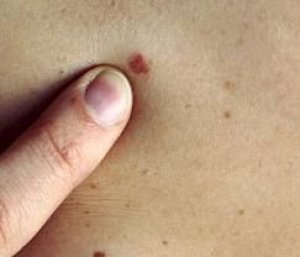
All iLive content is medically reviewed or fact checked to ensure as much factual accuracy as possible.
We have strict sourcing guidelines and only link to reputable media sites, academic research institutions and, whenever possible, medically peer reviewed studies. Note that the numbers in parentheses ([1], [2], etc.) are clickable links to these studies.
If you feel that any of our content is inaccurate, out-of-date, or otherwise questionable, please select it and press Ctrl + Enter.
New anti-cancer drugs could help fight advanced melanoma
Last reviewed: 02.07.2025
 ">
">Melanoma (skin cancer) is the most difficult form of malignant tumor to treat, but today people suffering from such malignant tumors have a chance for a complete cure. In Chicago, specialists presented the results of their research, which had some success in the fight against melanoma. In their experiments, scientists used completely new drugs.
Previously, specialists focused on the direct impact on cancer cells. This time, scientists decided to study the immune system of cancer patients. Experts developed two new drugs - nivolumab and pembrolizumab, the main effect of which was to increase the ability of the immune system to resist the development of malignant tumors (usually, drugs that destroy cancerous tumors were used to treat cancer).
The statistics for melanoma patients are quite sad: the majority of patients, from the moment a tumor is discovered on the skin, live no longer than six months.
Scientists conducted experimental studies of new drugs on several hundred volunteers. As a result, the mortality rate among melanoma patients became lower. After the experiment, almost 70% of patients showed increased resistance to cancer. In one patient diagnosed with advanced melanoma and metastases in the lungs, the disappearance of metastases was noted after treatment with new drugs.
Nivolumab was tested together with ipilimumab. The study involved 53 volunteers. As a result, 85% of the participants were alive after one year from the start of the experiment, and 79% after two years.
Today, research continues. At present, specialists in London are testing new drugs for the treatment of other forms of cancer, but scientists can already say with confidence that new discoveries will revolutionize the treatment of malignant tumors. New drugs help block the path that cancer uses to remain undetected by the immune system.
Regarding side effects, the subjects reported increased sweating, and scientists recorded loss of consciousness in two people. However, despite the fact that the new drugs show such encouraging results, independent experts note that this is only the first phase of the study. Scientists intend to conduct further tests on a larger number of volunteers and the results will be known in about 12 months.
Previously, a group of researchers proposed an unusual way to deliver drugs to the site of a cancerous tumor. The specialists developed fat nanocapsules (liposomes), in which the medicinal agent was released only after entering the cancer cell. The scientists proposed two forms of liposomes: the first contained adenosine triphosphate, the second - a complex of DNA and doxorubicin (an antibiotic). Positively charged peptides and lipids were located on the surface of the nanocapsules, as a result of which the liposomes connected with cancer cells. The natural mechanism of capturing external material allowed the medicinal agents to penetrate cancer cells. When DNA molecules reacted to adenosine triphosphate, the release of the medicinal agent began, which ultimately led to the death of cancer cells.
This treatment method has already been tested on laboratory rodents that were injected with breast cancer. After the introduction of liposomes, the malignant formation significantly decreased.

 [
[